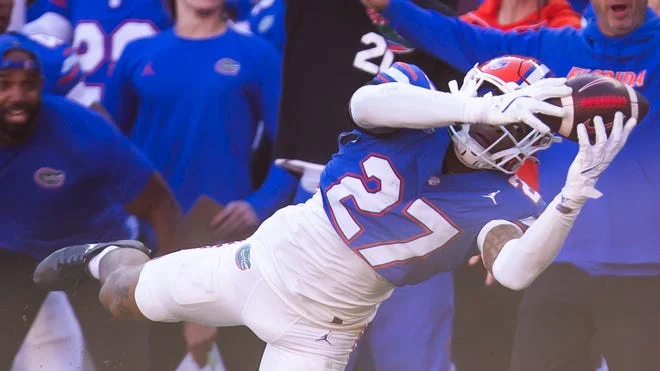
From Gridiron Glory to Legal Turmoil: What Really Happened to This College Football Star?
In a stunning turn of events that has rocked the college football world, Florida Gators cornerback Dijon Johnson finds himself at the center of a legal storm. As details emerge from his recent arrest in Tampa, questions swirl about the consequences for his promising career and the broader implications for student-athletes. This incident highlights the precarious balance between personal choices and public scrutiny in high-stakes sports.
The trouble began on a routine Friday evening in Tampa, where police pulled over Johnson for failing to stop at a signal. According to police reports from Hillsborough County, officers detected a strong odor of burned marijuana emanating from his gray Dodge Challenger. Johnson reportedly became argumentative, refusing to exit the vehicle, which escalated the situation. He was eventually removed and taken into custody, leading to a search of the car that uncovered marijuana, 8 grams of synthetic marijuana in a backpack, and a loaded black Glock 19 pistol with 17 rounds.
These findings resulted in serious charges: a second-degree felony for possession of a firearm, a third-degree felony for the synthetic substance, and misdemeanors for marijuana possession and resisting arrest without violence. At 21 years old, Johnson—a 6-foot-1, 196-pound junior from Tampa—had been making his mark on the field, recording 27 tackles and two pass breakups in the previous season. His arrest raises critical questions about accountability in college sports, where athletes are often idolized yet held to high standards. Coach Billy Napier issued a measured statement, noting that the program is "aware of the situation" and will "continue to gather facts, cooperate with and monitor the legal and administrative processes." This response underscores the delicate handling of such cases, balancing support for the player with institutional integrity.
Comparisons to similar incidents in college football reveal a pattern: high-profile arrests can derail careers and spark debates on drug policies and mental health support for athletes. Johnson's attorney, Tim Taylor, has already filed pleas of not guilty to all charges, signaling a potential legal battle ahead. Released on a $8,500 surety bond, the young athlete now faces uncertainty, with possible repercussions from the University of Florida's administration. This event not only spotlights the risks associated with synthetic drugs and firearms but also prompts a deeper examination of the pressures on student-athletes in Florida, a state known for its intense sports culture.
As this story develops, it's clear that Johnson's case could influence discussions on athlete conduct and reform in collegiate programs. The intersection of sports, law, and personal responsibility makes this more than just a headline—it's a cautionary tale. What do you think: Should sports programs do more to prevent such incidents, or is this a personal matter? We invite readers to share their thoughts in the comments below and help shape the conversation.